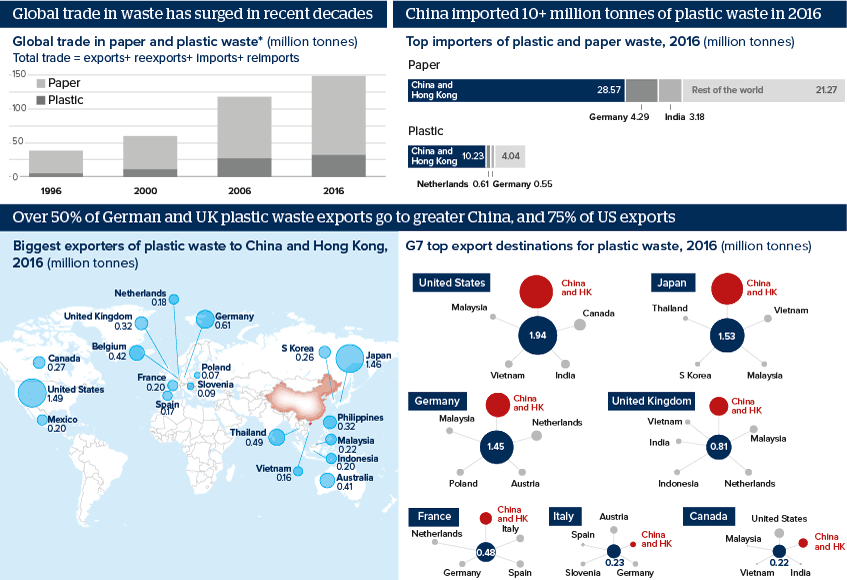China's waste ban will encourage recycling innovation
On January 1, China, the world's largest waste market, banned 24 grades of waste imports to meet environmental goals
Source: UNCOMTRADE Database.
Outlook
At the five-yearly party Congress in October, reducing pollution was identified as one of China's three priorities for the next three years. After warning the World Trade Organisation in July of its plans to ban 'yang laji' (foreign rubbish), the ban on low grades of plastic, paper and textiles waste came in on January 1.
Since 2013, China has been importing less waste, giving countries time to prepare. Nonetheless, combined with Hong Kong, it remains the largest market for G7 waste. More of this waste will stay at home, needing to be landfilled, stockpiled or incinerated, increasing pollution. Longer term, it could spark recycling innovations, raising recycling and reducing pollution.
Impacts
- Less than 20% of plastic is recycled but innovation is rising; new technologies will convert more used plastic into fuel and new products.
- Over two-thirds of UK waste exports go to Asia and the rest to the EU, governed by EU law; it is uncertain how Brexit will influence this.
- Other Asian markets, notably India and Vietnam, may take in more waste but they face the same environmental pressures as China.
- There is a risk the ban does not help China; the country is producing more waste internally that is at least as dirty as foreign waste.
See also
- ‘Right to repair’ schemes will boost sustainability - Oct 7, 2020
- China’s waste crackdown will create winners and losers - Jun 12, 2020
- US plastics and recycling troubles will worsen - Jan 20, 2020
- South-east Asia and West may cooperate more over waste - Jan 7, 2020
- Fast fashion faces rising sustainability pressure - Aug 16, 2019
- Tech advances will bolster long-term copper demand - Apr 15, 2019
- E-waste endangers developing nations' catch-up growth - Mar 18, 2019
- Waste management is key to sustainable global growth - Aug 15, 2018
- Plastic bans will rise but recycling faces constraints - Aug 7, 2018
- EU plastics strategy will hinge on public concern - Jan 29, 2018
- Socially conscious investment will expand in 2018 - Jan 10, 2018
- Battle against smog will cost China heavily - Nov 20, 2017
- More graphic analysis
